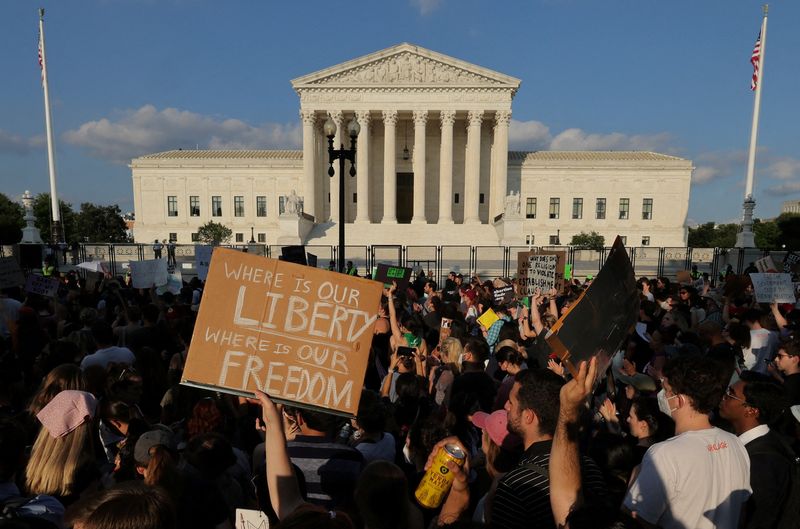By Lawrence Hurley and Andrew Chung
WASHINGTON (Reuters) - The U.S. Supreme Court's most consequential term in decades, with blockbuster rulings on abortion, guns, religion and climate change policy, illustrated how its expanded conservative majority is willing to boldly use its power with far-reaching impacts on American society.
Democratic President Joe Biden's appointment of Justice Ketanji Brown Jackson, sworn in on Thursday to replace retiring fellow liberal Justice Stephen Breyer on Thursday, does not change the court's ideological balance, with a 6-3 conservative majority.
The majority's assertiveness could continue in a number of major cases in the court's next term, which begins in October.
Here is a look at what the court did in its latest term, which ended on Thursday, and where it is headed.
ABORTION AND PERSONAL FREEDOM
In the June 24 abortion ruling, the court overturned the landmark 1973 Roe v. Wade decision that legalized the procedure nationwide, giving conservative activists a long-awaited victory. The court returned abortion regulation to the states. The decision immediately led to conservative-leaning states seeking to enforce total bans and other abortion restrictions that had previously been blocked by lower courts.
Some conservatives would like to go further and ban abortion nationwide, either through an act of Congress or via a Supreme Court decision, although it remains to be seen if the justices would be receptive to such an approach.
Conservative Justice Clarence Thomas caused alarm on the left by writing in his concurring opinion that the court should consider overturning other precedents going back decades protecting individual freedoms including gay marriage, same-sex intimacy and access to birth control. It is unclear if other justices would sign on to such a move.
GUNS
In another landmark ruling expanding gun rights, the court on June 23 found that the U.S. Constitution protects an individual's right to carry a handgun in public.
The ruling, which invalidated New York's limits on that practice as a violation of the Constitution's Second Amendment right to "keep and bear arms," will have the biggest impact in states and localities with stricter gun control measures in place.
Legal scholars predict that other gun restrictions will fall given that the ruling also declared that, going forward, lower courts must assess the constitutionality of gun restrictions by comparing them to those traditionally adopted throughout U.S. history.
CLIMATE CHANGE AND FEDERAL REGULATION
The Supreme Court on Thursday curbed the Environmental Protection Agency's ability to restrict greenhouse gas emissions from power plants in a ruling that limits federal agency power.
The decision, a blow to the Biden administration's aggressive plan to curb carbon emissions, has broad implications because the court invoked what it calls the "major questions" doctrine, which holds that agency actions of nationwide importance require explicit authorization from Congress. Business groups challenging regulations are now likely to bring up the doctrine in court challenges while judges have latitude to interpret what constitutes a major question.
RELIGION
The court in a series of recent rulings further chipped away at the wall separating church and state, eroding American legal traditions intended to prevent government officials from promoting any particular religion.
In all the cases, including a June 27 decision in favor of a public high school football coach who led prayers on the field with players after games, the court ruled against government officials whose policies and actions were taken to avoid violating the Constitution's First Amendment prohibition on governmental endorsement of religion - known as the "establishment clause."
The court has opened the door to further litigation on the extent to which government employees, including public school teachers, can express their religious views at work, while also making it easier for religious entities to participate in taxpayer-funded programs.
RACE
Among the cases the court already has taken up for its next term are two that give its conservative bloc an opportunity to end college and university policies considering race in admissions to achieve more student diversity.
Conservatives have long complained about affirmative action policies used by many colleges and universities to increase their numbers of Black and Hispanic students.
The court will also hear a dispute over the legality of decades-old federal requirements that give Native American families priority to adopt Native American children, which challengers argue discriminates against non-Native Americans.
ELECTIONS
The Supreme Court has in recent years made it harder for courts to second guess the actions of politicians in crafting voting rules and electoral boundaries.
On Thursday, the justices agreed to hear in their next term a Republican-backed appeal from North Carolina that could give state legislatures even more power over federal elections by limiting the ability of state courts to review their actions. The case could have broad implications for the 2024 elections and beyond.

According to legal experts, insulating legislatures from pushback by state courts or even governors could impact who wins contested elections and make it harder to challenge voting restrictions including those enacted by Republican legislators in a number of states in the wake of former President Donald Trump's false claims of widespread voting fraud in his 2020 loss to Biden.
Another case the court will hear in its next term could further weaken the landmark 1965 Voting Rights Act enacted to protect Black and other minority voters. The case involves a dispute over Republican-drawn U.S. House of Representatives districts in Alabama.